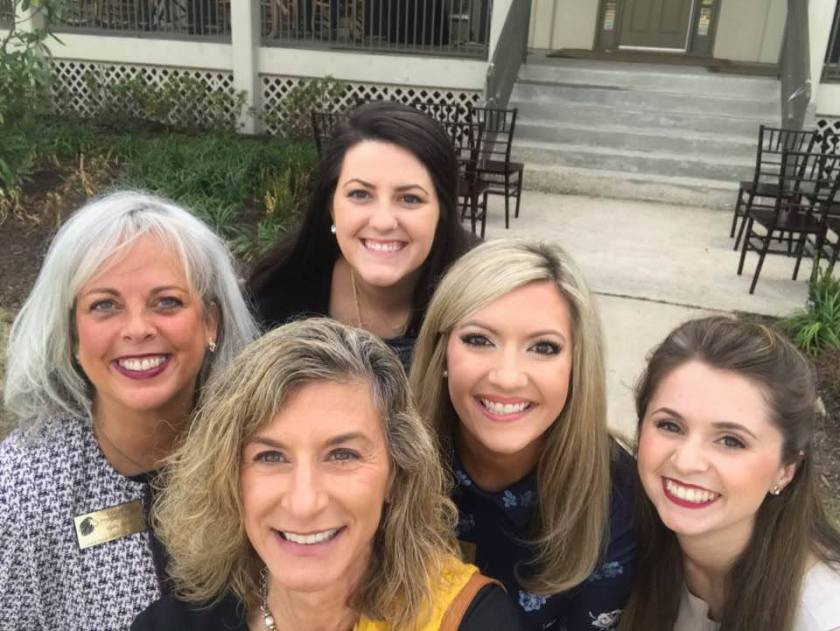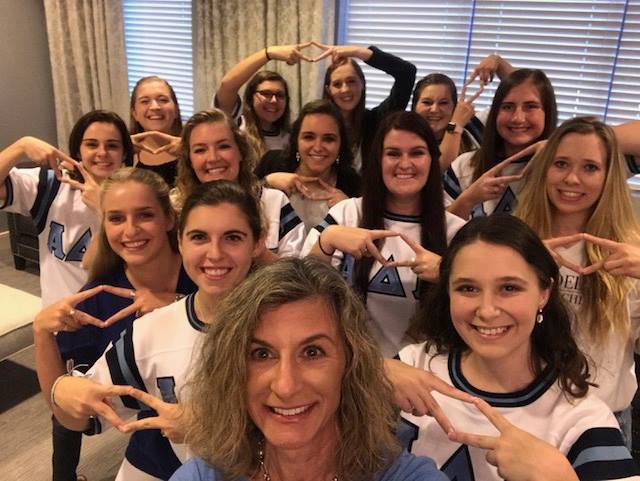by Jan Maisch, International Vice President of Collegiate Membership
 Why should anyone thank another a sister for doing a job? And why should we ever thank a member for doing what they are supposed to do? These are common questions in many chapters. Thank you, acknowledges the good things we get from others, especially when given out of the goodness of their hearts.
Why should anyone thank another a sister for doing a job? And why should we ever thank a member for doing what they are supposed to do? These are common questions in many chapters. Thank you, acknowledges the good things we get from others, especially when given out of the goodness of their hearts.
Sisters are less likely to feel or express gratitude where they give their most time. It’s not that members don’t crave appreciation, both giving and receiving. When a sister hears thank you, it makes them feel competent and motivated. Saying thank you to your sisters makes them feel happier and more fulfilled on any given day.
Why do some people suppress gratitude for tasks? It may be because no one gives away anything; every exchange is fundamentally economic. In the workplace, we don’t deliver that memo to our boss at three o’clock sharp out of the goodness of our hearts; it is what we are being paid to do. Our thanks is a paycheck. Failure to do what you are asked to do, and you may not see another one.
Some of us may believe that expressing any gratitude could lead someone to take advantage of them. When we acknowledge our interdependence, we make ourselves vulnerable. The result is vicious which can have a terrible effect on a chapter’s morale. Why should this be the case? Because the need to work for a paycheck is the motivation, we bring to work. In Alpha Delta Pi, we don’t work for money. We work for a sense of accomplishment, for a feeling of purpose. We invest ourselves in our tasks and responsibilities, and work affects our emotional states.
Gratitude is a non-monetary way to support those non-monetary motivations. Thank you does not cost a dime, and it has measurably beneficial effects. A thank you from a chapter leader, or advisor will give members a strong sense of both self-worth and self- effectiveness. It also reveals that the expression of gratitude has a spillover effect. Members become more trusting of each other, and more likely to help each other out. Building a culture of appreciation within your chapter is not easy, but it’s worth it.
 So here are some tips for fostering gratitude within your chapter. Start at the top because a clear takeaway of appreciation is members need to hear thank you from chapter leaders first. It’s up to the people with the power to, consistently, and authentically say thank you in both public and private settings. These efforts can also translate into protocols and procedures. When looking at your chapter officer descriptions, did you ask, how do you wish to be thanked? Add gratitude to team/committee and chapter meetings, and allocate five minutes for officers to say thanks to each other.
So here are some tips for fostering gratitude within your chapter. Start at the top because a clear takeaway of appreciation is members need to hear thank you from chapter leaders first. It’s up to the people with the power to, consistently, and authentically say thank you in both public and private settings. These efforts can also translate into protocols and procedures. When looking at your chapter officer descriptions, did you ask, how do you wish to be thanked? Add gratitude to team/committee and chapter meetings, and allocate five minutes for officers to say thanks to each other.
Thank the members who never get thanked because every chapter has a group of people that hogs all the glory. In hospitals, it’s doctors. At universities, it’s faculty. And every chapter has high-profile individuals. But what about those who check us in, stuffs the envelopes, set up the chairs, or take care of the invitations? Thanking sisters who do thankless work are crucial because it sets the bar and establishes the tone. Public appreciation for members makes their contributions visible and thus broadens everyone’s understanding of how the chapter functions and needless to say, it improves morale and increases trust.
Aim for quality, not quantity because forcing sisters to be grateful does not work. It undermines gratitude, and it can make expressions of gratitude feel inauthentic. The key is to foster the voluntary, spontaneous expression of appreciation. How do we convey authenticity? When we are specific about recognition with members, it tells sisters that we are paying attention, rather than just going through the motions.
Provide many opportunities for gratitude in your chapter, because when you thank members, they provide help to others. But not everyone likes to be appreciated or wants to say thank you in public. Create many different kinds of opportunities for gratitude. For example, research consistently finds that keeping a gratitude journal makes you twenty- five percent happier. Can a chapter keep a journal and share it other than at a chapter meeting? Of course! Build a website or have a bulletin board and call it a “Gratitude Wall.” Encourage the thank you to target sisters instead of things. We are all thankful that the room was set up for the meeting, but the gratitude should go to the sisters who make the efforts to set it up.
Gift giving is another way to foster gratitude. Research shows that giving gifts may have a significant effect on working relationships and reciprocity and non-monetary contributions are the most beneficial of all. Giving creates appreciation, but giving can also be an excellent way to express gratitude, especially if the sister in question is shy. You can say thanks by showing it in a reply all in an email or giving a handwritten note. It leads to more trust in if it’s reciprocal and sincere.
Gratitude provides positive effects on changing conflicts, which can benefit the chapter. It starts with chapter leaders. For example, a chapter president with two bickering members might open a meeting by expressing sincere appreciation of both individuals. Throughout the process, chapter leaders should never miss an opportunity to say thank you. The attitude of gratitude will have a positive feedback effect, even if results are not noticeable right away.
 Cultivating a culture of gratitude might be the best way to help a chapter prepare for stresses that come with change, conflict, and failure. Practicing gratitude will assist a chapter if they encounter a setback. There is evidence that grateful people are more resilient to stress, whether minor everyday hassles or personal upheavals.
Cultivating a culture of gratitude might be the best way to help a chapter prepare for stresses that come with change, conflict, and failure. Practicing gratitude will assist a chapter if they encounter a setback. There is evidence that grateful people are more resilient to stress, whether minor everyday hassles or personal upheavals.
Gratitude helps members see beyond a disaster by recognizing their gains. It provides a tool to turn an obstacle into an opportunity, and reframe a loss as a potential gain. If your chapter goes through a crisis, use a chapter meeting to gain a new perspective on the incident. Here are a series of questions to help sisters recover from stressful experiences:
What lessons did we learn from this experience? What ways can we be thankful for by what happened to us, even though we were not at the time it happened? What ability did the experience stretch us? What are the ways we have become a better chapter because of it? Has the situation eliminated an obstacle that prevented us from feeling grateful?
Overcoming an aversion to gratitude within your chapter, members will discover one more skill they can cultivate alongside skills like communication, negotiation, and forgiveness. It’s something members can learn, and your entire chapter will benefit.
My gratitude wall:
Thank you all our International Officers and Executive Office Staff for the many hours and hard work you to create and execute a successful 2018 District Leadership Conference. Alpha Delta Pi Chapters are fortunate to have you oversee our six regional conference activities. I am grateful for your dedication and commitment to keep Alpha Delta Pi First, Finest, Forever. <>!!
I want to tell all our advisors and mentors how much I appreciate the endless hours of service you dedicated to our chapters. I am grateful for the diligence and dedication demonstrated by each of you. Thank you for your significant contribution to the success of our chapters<>!!
Take a DIAMOND leap and take this opportunity to share something which chapters can be grateful.